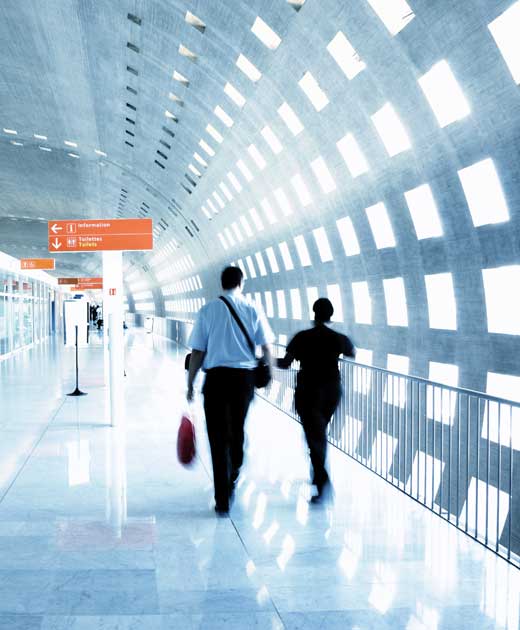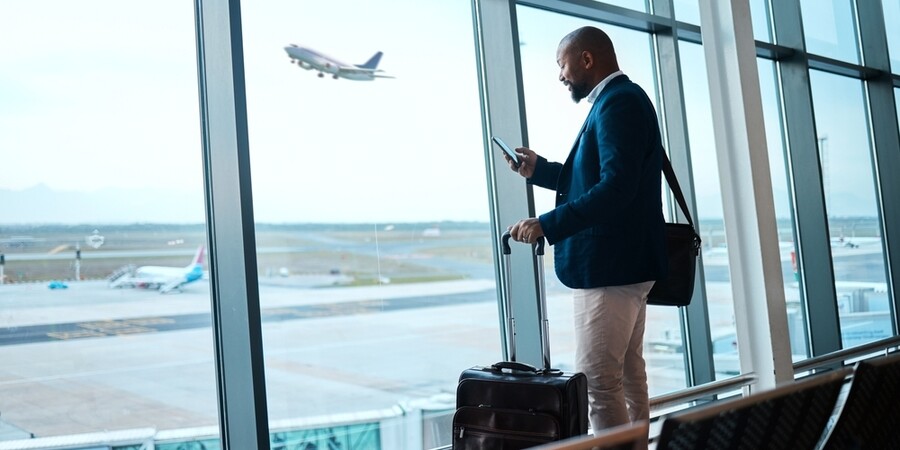
Select your preferred language
- Deutsch English English (Australia) English (China) English (India)
- English (United Kingdom) Español (Latinoamérica) Español (España) Français Italiano
- Português (Brasil) Suomi Svenska 中文

Top tips on how to plan a business trip

Follow these 6 steps for an effective business trip:
- Make your travel arrangements well in advance
- Select your accommodation based on both price and convenience
- Create an itinerary
Research your destination
- Remember your electronics, accessories and travel documents
- Prepare for your meeting
In today’s digital world, we can communicate across different time zones at a moment’s notice. However, when it comes to brokering a big deal or fostering a solid and long-lasting business relationship, nothing beats face-to-face interaction.
Corporate travel is still so important, and it’s equally important for anyone making a business trip to prepare thoroughly. When you arrive at your destination relaxed and well-prepared, you’re better equipped to make a good impression and focus on the purpose of your meeting. Preparation lets your mind focus on the here and now, making sure you stay on the ball in that all-important meeting. If you’d like to fine-tune how you get ready for your next excursion, follow these essential tips to become an effective business trip planner.
Make travel arrangements
Whether it’s your name on the travel documents or you’re a travel manager, planning business travel thoroughly is important. Your first step should always be to familiarize yourself with your company’s corporate travel policy . You’re making travel arrangements for a business trip, not planning a personal or a short break, so being compliant with your company policy is essential.
Next, it’s time to book your travel. This may involve traveling by air, rail, car hire or even boat. Think about the journey door-to-door, balancing travel times against cost and convenience. Visualize the various steps of the trip from A to B. Consider details like how long it will take to move between airport and railway station, the time it takes to fill out paperwork at the vehicle hire company, and whether luggage storage might be useful. Use multiple sources and different comparison sites, researching which companies are offering the best deals. Again, be aware of any budget restraints in your company’s travel policy.
Don’t forget the small details. Does the airplane have Wi-Fi so you can work on the move? Would leaving a day earlier allow you to arrive at your first meeting better rested and prepared? At this stage, the more carefully you prepare, the more confident and relaxed you’ll be when you depart.
Select your accommodation
Preparing business travel is, of course, only half the job. Choosing the best accommodation for your requirements is also essential. If you’ve only got one meeting place to reach, make sure you book a hotel that’s nearby – rather than be swayed by a more luxurious option that might be a stressful 45 minute trip away. Use maps on your smartphone to measure distances from the station or airport to your hotel – and remember the roads and transport networks will be busier at certain times of day.
Check your company’s hotel policies to see if there are any preferred hotels - you might be able to get a good deal too. When considering the cost, make sure you compare rates for similar types of accommodation and make sure you select something that’s fairly priced – some companies even stipulate a cost per day that would limit the choice of hotels.
It’s also a good idea to pay close attention to the amenities at the hotel. Some tourist-focused hotels may serve breakfast too late for your early starts, and as a business traveler you’re likely to want free Wi-Fi, 24-hour room service, plenty of power points for charging your devices. CWT Hotel Intel gives travelers access to trusted peer hotel reviews and can be a handy tool for business trip planners.
Create a detailed itinerary
Your itinerary is your blueprint for a successful business trip. Use it to stay in control of every detail – from transport times and the names of those you’re meeting, to your travel reservations and hotel address. Be sure to allow yourself extra time on your itinerary for relaxing, meetings that have been delayed or overrun, and busy traffic. Consider using a specially designed tool like the myCWT app , which syncs your itinerary with work calendars, and allows travelers to share this with colleagues. This is handy from a communication and efficiency perspective, and as a safety measure if you’re travelling to an unfamiliar destination.
It may be that you’re traveling to a destination you are familiar with and feel comfortable in. Or, you may be entering unchartered territory. If that’s the case, research is essential to avoid unnecessary risk. For example, some cities are well known for pick pockets, so you’ll need to be extra careful when storing important and expensive items like phones in your pockets. Depending on where you’re going, reading up on the current political situation at your destination could also be prudent.
Perhaps you’re traveling to a city or country with a different culture and customs to your own. Avoid looking foolish or, worse, causing offence, by researching the differences in behavior and manners before you arrive. For example, if you’re taking potential clients for a meal, do you know the etiquette on tipping, or when to give people your business cards? Or, if you’re visiting a country where English isn’t the common language, you could even learn a few basic phrases, such as greetings and “thank you”, which could make all the difference when making a good first impression.
Prepare your travel documents
Hours of careful preparation and research will all be wasted if you forget vital travel documents. Traveling between countries requires a current, valid passport, travel tickets and sometimes a visa. It’s key to research whether or not you need a visa as soon as possible, even if you are just transiting through a country, without stepping foot outside the airport. Some embassies can take a number of days or even weeks to issue visas. Even if you’re not traveling to a different country, you may need photo ID to clarify that your name corresponds to the one on the ticket - your passport or driving license are the best options so keep them safe at all times.
Remember your electronic accessories
Stay as productive as possible on your trip by taking a laptop or tablet – it’ll make your travel time really count. Remember to pack the relevant chargers and adapters, too. You can usually pick these up at the airport when you’re passing through, but being prepared is key and will save you time and money in the long run.
Get ready for your meeting
So you’ve followed all the right steps for planning a business trip, but what about your business objectives and the meeting itself? Making a note of what you hope to achieve on the trip can help improve your focus - even if you simply want to reach out to new contacts or gain a general overview of potential new client. Arm yourself with as much information as possible about the people you’ll meet, as well as the places they’ll be. What’s the dress code? If you’re visiting an industrial site, for example, will you need sturdy shoes? If you’re going to be giving a presentation, what format will it take and will your host have the equipment you need? Simply emailing ahead to check if they have suitable screens and cables can ensure you avoid embarrassing delays or confusion that would get your meeting off to an awkward start. That first impression counts so give yourself the best chance of making a good one.
By setting aside the time to prepare, conducting some detailed research and following these business travel tips, you can optimize your chances of a productive and enjoyable trip.
More publications
Contact us today to see just what we could do for your business.

Traveler help
Help me manage my travel

Careers at CWT
Explore career opportunities
Careers @ CWT

Learn more about travel management
Contact CWT
Learn more about our travel management offering
Travelers: manage your travel here . The below form is for inquiries about our corporate travel management offering.
To reach out to CWT to learn more and also receive communications (email or phone) on our products and services, please complete the form below. You can unsubscribe at any point in the future from our mailing list using the ‘unsubscribe’ link on any of our emails.
Thank you for your interest in CWT, we will contact you soon.
Thank you for your interest in CWT. Unfortunately, CWT cannot offer services in your home country at this time. Your contact request has not been submitted.
With kind regards,
See how Cvent can solve your biggest event challenges. Watch a 30-minute demo.
25 Business Travel Planning Tips for 2024

As someone who frequently travels for business, you know just how crucial it is to plan for each trip. From booking flights and accommodations to scheduling meetings and events, there are countless factors to consider when it comes to business travel planning. But with the right approach, you can make the process easier, more efficient, and less stressful.
This blog post will provide an easy guide to business travel planning with tips and strategies to help you stay organized and get the most out of your travels.
Top 25 Business Travel Planning Tips

1. Determine Your Travel Needs
Before you begin making any arrangements for your trip, you'll need to figure out your travel needs. This includes identifying the purpose of your trip, the dates you'll be traveling, and any specific requirements you have.
For example, will you need to rent a car, hire a driver, or take public transportation? Do you need to be in a specific location for a meeting or event at a particular time? Make a list of all your travel needs so you can refer to it as you plan your trip.
2. Set Your Budget
Once you've identified your travel needs, it's time to set your budget. This will help determine how much you can spend on flights, accommodations, transportation, meals, and other expenses.
Be sure to account for your company policies or restrictions, such as maximum daily allowances for meals or limits on travel expenses.
3. Book Flights and Accommodations
You can begin booking flights and accommodations once you know your travel needs and budget for flights; book as early as possible to get the best prices and seat selections.
You can use online travel booking sites like Expedia, Kayak, or Orbitz to compare prices and find the best deals. Regarding accommodations, consider factors like location, amenities, and price. Sites like Airbnb and Booking.com can help you find many options in your desired location.
4. Plan Your Schedule
With your flights and accommodations booked, you can start planning your schedule. See if any meetings or events are on your calendar or if you have to schedule them during your trip.
You can use a calendar app like Google Calendar or Outlook to keep track of your schedule and be sure to account for any time differences between your home base and your destination. You can also use travel planning apps like TripIt to consolidate all your travel details in one place.
5. Pack Efficiently
For many, packing is one of the most stressful parts of business travel planning, but it doesn't have to be. With a bit of planning, you can pack efficiently and avoid overpacking.
Make a packing list that includes all the items you'll need for your trip, and be sure to consider the climate and culture of your destination. Maximize space in your luggage using packing cubes or compression bags, and choose versatile clothing items that can be mixed and matched.

Here's a business travel checklist to get you started.
6. Manage Expenses
Managing expenses is a critical part of business travel planning. Keep all your receipts and record your expenses as you go. You can use apps like Expensify or Concur to track your expenses and create expense reports which you can directly upload to your company's corporate travel management software . Adhere to all the travel policies of your company or restrictions regarding expenses, and don't hesitate to ask for clarification if you're unsure.
7. Stay Connected
Staying connected while on a business trip is essential. Please ensure you have all the necessary devices and chargers, and consider using a mobile hotspot or buying a local SIM card for internet access.
You can also use apps like Skype or Zoom to stay connected with colleagues and clients, and consider using a VPN to access secure company networks while traveling.
8. Stay Healthy
Staying healthy while on a business trip is also crucial. Get plenty of rest, stay hydrated, and exercise regularly. You can also research local health risks and take appropriate precautions, such as vaccinating or using insect repellent. If you're traveling internationally, be sure to bring any necessary medications or prescriptions with you.
9. Be Prepared for Emergencies
No matter how well you plan, emergencies can still arise during business travel —plan for emergencies, such as lost or stolen luggage, flight cancellations, or medical emergencies.
Keep important documents like your passport and travel itinerary in a secure location, and make sure you have emergency contact information for your company, travel provider, and local authorities.
10. Reflect and Learn
After your business trip, take some time to reflect on areas of improvement and what worked well. Did you encounter any unexpected challenges? Were there any areas where you could have been better prepared or more efficient? You can use what you learned to enhance your travel planning process for future trips.
11. Make the Most of Your Downtime
While business travel primarily focuses on work, making the most of your downtime is essential. Use your free time to explore the local area, try new restaurants, or attend cultural events. It can help you recharge and also make your trip more enjoyable.
12. Network and Build Relationships
Business travel is also an opportunity to network and build relationships with colleagues, clients, and other professionals. Attend networking events, schedule one-on-one meetings, and engage in informal conversations with others in your field. Building relationships can help you advance your career and make future business trips more productive.
13. Consider Travel Rewards Programs
If you frequently travel for business, it's worth considering travel rewards programs to help you save money and earn perks. Many airlines, hotels, and car rental companies offer loyalty programs that provide benefits like free upgrades, priority boarding, and discounted rates. Research your options and sign up for programs that align with your travel needs and preferences.
14. Follow Travel Safety Guidelines
Travel safety is always a top priority, especially after the global pandemic. Follow all relevant travel safety guidelines, such as properly and regularly washing your hands and wearing a mask in areas where air quality or illness are a risk. Stay updated on any travel restrictions at your destination, and be prepared to adjust your plans if necessary.
15. Use Travel Planning Services
If you need more time or expertise to plan your business trip, consider using business travel solutions or planning services. Many companies offer customized travel planning services to help you with everything from booking flights and accommodations to scheduling meetings and events. It can help you save time and ensure your trip is well-organized and productive.
16. Take Advantage of Technology
Technology can be a valuable tool for business travel planning. You can use apps like Google Maps or Citymapper to navigate your destination, and consider using translation apps like Google Translate to communicate with locals.
You can also use productivity apps like Trello or Asana to stay on top of your tasks and deadlines and document scanning apps like CamScanner to keep track of important documents.
17. Be Flexible
Finally, it's essential to be flexible regarding business travel planning. Unexpected changes can arise, such as flight delays or last-minute meetings. Try to remain flexible, and be prepared to adjust your plans as needed. You can have a successful, stress-free business trip by staying open-minded and solution-focused.
18. Consider Cultural Differences
When traveling to a different country or region, it's crucial to consider cultural differences. This can include language barriers, customs, and social norms. Research the local culture before your trip and try to learn some key phrases in the local language. Awareness of cultural differences can help you avoid misunderstandings and build stronger relationships with locals.

19. Use Travel Insurance
Travel insurance can provide significant protection in case of unexpected events during your trip. It can include medical emergencies, trip cancellations, or lost luggage. Consider purchasing travel insurance before your trip to ensure protection during unforeseen circumstances.
20. Stay Productive During Transit
Business travel often involves long transit periods, such as flights or train rides. Use this time to stay productive by catching up on work or reading relevant materials. Consider bringing a laptop or tablet, noise-canceling headphones, and any necessary chargers or adapters to maximize your time and stay on top of your tasks.
21. Consider Sustainable Travel Practices
Sustainable travel practices can help reduce your environmental impact while traveling for business. This can include using public transportation or carpooling, choosing eco-friendly accommodations, and minimizing plastic waste. Consider incorporating sustainable practices into your travel planning to help promote a healthier planet.
22. Choose the Right Travel Credit Card
A travel credit card can be valuable for business travel. Look for cards that offer rewards like points or miles that you can redeem for flights, hotels, or other travel-related expenses. You can also benefit from credit cards that cover travel and rental car insurance. Consider different cards' annual fees, interest rates, and rewards programs before choosing.
23. Consider Time Zone Differences
Time zone differences can be challenging when traveling for business, particularly when scheduling meetings or calls. Use a time zone converter app like Time Zone Converter or World Clock to stay on top of the time differences between your location and destination. Be prepared to adjust your schedule accordingly to ensure you're available during critical times.
24. Be Mindful of Jet Lag
Jet lag can be a significant challenge when traveling across multiple time zones. Please be aware of the symptoms of jet lag, such as fatigue, headaches, and difficulty sleeping, and take steps to minimize its impact. This can include staying hydrated, getting plenty of rest, and adjusting your sleep schedule before your trip.
25. Plan for Time Off After Your Trip
Finally, planning for time off after your business trip is important. Returning to work immediately after a long journey can be physically and mentally challenging. Please take a day or two off after your trip to rest and recover before returning to work to ensure you're ready to tackle your next professional challenge.
Conclusion
In conclusion, business travel planning can be daunting, but you can make it easier and more efficient with the right approach. Determining your travel needs and following these tips can ensure a successful and productive business trip. Happy travels!
Cvent Guest
Cvent is a market-leading meetings, events, and hospitality technology provider with more than 4,000 employees, ~21,000 customers, and 200,000 users worldwide.

More Reading
“discover cardo brussels: your ultimate mice hub in the heart of europe”, congratulations to the 2024 excellence awards winners, 33 event email subject lines that drive open rates.
Subscribe to our newsletter
- PRO Courses Guides New Tech Help Pro Expert Videos About wikiHow Pro Upgrade Sign In
- EDIT Edit this Article
- EXPLORE Tech Help Pro About Us Random Article Quizzes Request a New Article Community Dashboard This Or That Game Popular Categories Arts and Entertainment Artwork Books Movies Computers and Electronics Computers Phone Skills Technology Hacks Health Men's Health Mental Health Women's Health Relationships Dating Love Relationship Issues Hobbies and Crafts Crafts Drawing Games Education & Communication Communication Skills Personal Development Studying Personal Care and Style Fashion Hair Care Personal Hygiene Youth Personal Care School Stuff Dating All Categories Arts and Entertainment Finance and Business Home and Garden Relationship Quizzes Cars & Other Vehicles Food and Entertaining Personal Care and Style Sports and Fitness Computers and Electronics Health Pets and Animals Travel Education & Communication Hobbies and Crafts Philosophy and Religion Work World Family Life Holidays and Traditions Relationships Youth
- Browse Articles
- Learn Something New
- Quizzes Hot
- This Or That Game
- Train Your Brain
- Explore More
- Support wikiHow
- About wikiHow
- Log in / Sign up
How to Plan Your Business Travel
Last Updated: March 18, 2024 Approved
This article was co-authored by Michael R. Lewis . Michael R. Lewis is a retired corporate executive, entrepreneur, and investment advisor in Texas. He has over 40 years of experience in business and finance, including as a Vice President for Blue Cross Blue Shield of Texas. He has a BBA in Industrial Management from the University of Texas at Austin. There are 9 references cited in this article, which can be found at the bottom of the page. wikiHow marks an article as reader-approved once it receives enough positive feedback. In this case, 100% of readers who voted found the article helpful, earning it our reader-approved status. This article has been viewed 84,953 times.
Planning a work-related trip can be a stressful endeavor. On top of your usual travel concerns, you also have to keep your mind focused on the business aspect of your trip. Business travel doesn't have to be stressful, though. With a little planning and preparation, you can help ensure your trip runs as smoothly as possible so you can stay focused on your work.
Making Travel Arrangements

- If you're traveling internationally, you may need to secure a visa before you leave. You may also need certain vaccinations, including anti-malarial medication.
- If traveling to a city at an elevation above 4,900 feet (1,500 meters), you may be susceptible to elevation sickness. Try to give yourself a few days to acclimate before doing anything strenuous and start drinking two to three liters of water each day to stay hydrated.
- If you're traveling outside the country, find out if you can safely drink the tap water where you'll be. If not, you'll need to stick to bottled, purified water to stay healthy.

- Start with the date and time you're checking into and out of your hotel, then work your way through everything that you'll be doing while you're away on business.
- Don't forget to keep track of your flight's boarding and departure times so you know when you need to arrive at the airport.
- Highlight any work-related events on your schedule. That way your most important priorities won't get lost in the shuffle.

- When booking your flight, make sure that you use your sky miles account so that you can get points and rewards. You might even have enough sky miles already to cover the cost of your flight!
- When booking your hotel, see if you can use sky miles or get points towards a rewards program. You should also make note of your hotel's policies on check-in, checkout, parking, and number of people per room.
- If you need a rental car, make sure that all the roads you'll be driving will be safe with your rental car. Research if you need two-wheel drive or four-wheel drive. Look around with different rental car companies to see which has the best rate.
- Some credit cards also have rewards plans and perks for traveling. See if your credit card comes with any of these benefits.
Preparing for Your Trip

- Make sure that all your identification is valid and up-to-date well in advance, as it can take several weeks for new documents to be prepared.

- Give yourself at least an extra 15 to 20 minutes if you'll need to print out your ticket upon arrival at the airport.
- If you have a paper ticket, keep it someplace where you won't lose it. You may want to store it with your ID or passport to ensure that you don't misplace any of those documents.
- If you're using a digital ticket, make sure you'll have reception wherever you're flying out of for the return trip. If you can't pull it up on your phone, you'll likely need to print out a paper copy at the airport.

- Try to pack as light as possible. Bring enough dress clothes for the trip and one or two pairs of casual clothes for exploring the town.
- Confirm that your bag will fit in the overhead compartment or under your seat by checking the carry-on bag size restrictions with your chosen airline.
- Check the Transportation Security Administration (TSA) website for any updates on prohibited items and packing suggestions to ensure your security check is as quick as possible.

- Read up on the culture and customs of the people you'll be doing business with.
- Talk to other colleagues or friends who have traveled to the country you'll be doing business in. This can help you get a better sense of what's acceptable and what isn't.
- Be respectful at all times. Remember that you're representing your business and possibly your culture, so you'll need to be on your best behavior at all times.

- Keep a backup copy of all your important information on your laptop or a USB flash drive.
- If you really want to cover all your bases, you can also print out hard copies of any important paperwork and keep those papers in a file with your travel documents.

- If possible, give yourself a few days before you leave and start going to sleep and waking up at the times you will be waking/sleeping once you reach your destination.
- Being aware of the time difference has professional implications as well. You'll need to ensure that you don't miss any important meetings or deadlines on your trip.

Taking Precautions to Avoid Jet Lag

- Limit your caffeine and alcohol consumption, as both of these can leave you slightly dehydrated.
- Try to drink two to three liters of water each day, but remember that you'll need more water if you're very active or in a hot environment. [10] X Trustworthy Source Mayo Clinic Educational website from one of the world's leading hospitals Go to source

- Aim to arrive around dinner time, then plan to stay up until about 10:00 pm in local time.
- When you get to your destination, avoid heavy meals. Instead, choose healthy snacks or a light meal that won't weigh you down. [12] X Research source
- You will most likely be tired after traveling, so by getting in around dinner time and eating a light meal, you'll start to get sleepy in time for a regular night's rest.

- Limit your exposure to bright screens, like laptops and cellphones, for at least a half hour before bed. Bright lights can reset your circadian rhythm, making it harder to sleep.
- Get as much sunlight as you can in the morning and early afternoon. This will help you remain wakeful and energetic during the day.
- Try to get some light to vigorous exercise each day, but be aware of when you work out. Some people find that exercising too close to bedtime affects their ability to sleep. [13] X Research source
- Bring earplugs and a sleep mask to help ensure that you get restful sleep each night, no matter what kinds of distractions present themselves at your hotel.
Expert Q&A
- Consider shipping large presentation materials and other business items that may difficult to carry while traveling. Just make sure that you ship them with enough time to arrive at your destination. If you decide to ship to your hotel, make sure that you contact the hotel and let them know about your shipment. Thanks Helpful 2 Not Helpful 0
- Opt for refundable tickets when you arrange your business travel, if at all possible. That way you have the ability to change your plans in case work or personal obligations get in the way of your scheduled flight. Thanks Helpful 0 Not Helpful 0

You Might Also Like

- ↑ https://www.forbes.com/sites/jacquelynsmith/2012/08/27/your-basic-guide-to-business-travel-abroad/#1168ef394f50
- ↑ https://www.huffingtonpost.com/kenny-kline/how-smart-entrepreneurs-prepare-for-business-travel_b_8533712.html
- ↑ https://money.usnews.com/money/careers/slideshows/10-tips-for-efficient-business-travel
- ↑ https://www.entrepreneur.com/article/236246
- ↑ https://sleepfoundation.org/sleep-topics/jet-lag-and-sleep
- ↑ https://www.entrepreneur.com/article/269947
- ↑ https://www.mayoclinic.org/healthy-lifestyle/nutrition-and-healthy-eating/in-depth/water/art-20044256
- ↑ https://www.sleepfoundation.org/travel-and-sleep/jet-lag
- ↑ https://sleepfoundation.org/excessivesleepiness/sleep-tools-tips/healthy-sleep-tips
About This Article

- Send fan mail to authors
Reader Success Stories
Mary Higgins
Jul 31, 2020
Did this article help you?
Sep 28, 2019


Featured Articles

Trending Articles

Watch Articles

- Terms of Use
- Privacy Policy
- Do Not Sell or Share My Info
- Not Selling Info
wikiHow Tech Help Pro:
Level up your tech skills and stay ahead of the curve
- English (UK)
- English (CA)
- Deutsch (DE)
- Deutsch (CH)
How to create a business travel itinerary + free template for 2024
- Flight numbers
- Travel schedule
- Departure times
- Arrival times
- Travel agency information
- Airline and reservation information
- Other important travel details
- Car rental pricing and details
- Pick-up locations
- Hotel booking check-ins
- Hotel information
- Reservation details
- Check-out time
- Meeting schedule
- Trip planner
- Daily activities
- Event or conference information
- Plus any trip-specific extra info.!
?)
Download your business travel itinerary template now
?)
Make business travel simpler. Forever.
- See our platform in action . Trusted by thousands of companies worldwide, TravelPerk makes business travel simpler to manage with more flexibility, full control of spending with easy reporting, and options to offset your carbon footprint.
- Find hundreds of resources on all things business travel, from tips on traveling more sustainably, to advice on setting up a business travel policy, and managing your expenses. Our latest e-books and blog posts have you covered.
- Never miss another update. Stay in touch with us on social for the latest product releases, upcoming events, and articles fresh off the press.
?)
Top 10 business travel challenges (and how to overcome them)
?)
4 steps to a successful corporate travel program
?)
How to make a business travel report + free template for 2024
- Business Travel Management
- Offset Carbon Footprint
- Flexible travel
- Travelperk Sustainability Policy
- Corporate Travel Resources
- Corporate Travel Glossary
- For Travel Managers
- For Finance Teams
- For Travelers
- Thoughts from TravelPerk
- Careers Hiring
- User Reviews
- Integrations
- Privacy Center
- Help Center
- Privacy Policy
- Cookies Policy
- Modern Slavery Act | Statement
- Supplier Code of Conduct
Unlock your potential in 2024 with the Star Achievement Series Designation Course

How to Plan Business Travel & Business Travel Planning Checklists
- June 4, 2013
Travel Planning for Executive & Administrative Assistants
When I was an executive assistant planning hundreds of trips for my executive over a 20-year period, I thought I did a good job. Most of the time, my executives were pleased. But I really didn’t understand the intricacies of travel until I became an executive and traveled often. For 22 years, I have been traveling; mostly within the United States. I have had a few trips to Bermuda and the Caribbean but not overseas—this is by choice. So, if I think it is tough being a traveler in the United States, just imagine how difficult it is for the executives who travel great distances often—and have to show up for meetings! Being a road warrior is not glamorous like people think. You spend hours and hours waiting in the airport; dealing with changed scheduled; late flights; bad weather; lost suitcases; rides that don’t show up; uncomfortable beds and noisy hotels. I could go on and on about the difficulties of traveling but I won’t. I hope you get the picture. So anything you can do to make your executive’s life easier when planning travel is outstanding! I am going to share with you, my tips from experience on both sides of the desk on how to plan business travel .
I often hear executives tell me that they don’t think their executive assistant or administrative assistant is doing the best job of the planning of their travel, even though their assistant has been working with them for years. So this subject is a big deal and one you should pay attention to. Of course, every executive has their preferences when it comes to travel. For me, I always want an aisle seat toward the front of the plane. And I prefer to sit on the left side of the plane, as you enter the plane. Some executives do not want less than a 60-minute layover because they don’t want to run through long concourses. You must know what your executive prefers and cater to that. Also, be warned that their preferences can change. So where I may tell Jasmine don’t let me get into a city later than 5:00 p.m., I may change my mind because it is summer and it will stay lighter later in the day; I have been to this city numerous times and know my way around; I know the client and class and can linger a little longer in the morning before showing up for the class.
I am sharing with you a few things to consider when you plan business travel. There are many more considerations and I will be offering online training on this topic later this year with other pertinent topics to make your life great and make you a more effective assistant. For now, consider some of these points as you arrange for business travel. As you go through my business travel checklist, ask yourself:
- Am I already doing this? If so, are you doing this every time?
- Do I need to do a better job?
- If I’m doing this, why not? How soon can I implement this action?
Business Travel Itinerary should include:
- Weather report for each day leader will be in the arriving city and other cities he will be visiting during his trip.
- Any issues or events in arriving city that could affect leader’s travel into the city or when he arrives or departs the city.
- Main contact’s cell phone number (for emergencies or in-transit arrival delays or changes).
- At the very top of the first page, have a noticeable box with ALL contacts’ names and telephone numbers. The leader should not have to hunt through the itinerary to locate these if he needs them quickly.
- Frequent Flyer Club Information – locations of clubs at the airport(s).
- Will food be served during the flight? If so, is it a snack or meal?
When traveling for business, a leader should leave the following items home:
- Copy of his/her itinerary (and other important information)
- International trips: Copy of passport (photo and visa pages)
- Unneeded credit cards
When booking flights, the assistant needs to consider:
- Layover time—should not be too long but must be long enough for the leader to walk through concourses and make his connection.
- Is this the best time of day for the leader to depart local airport based on when he needs to arrive?
- Is this the fastest route? Sometimes it is better to wait at the airport for a later flight that is a direct flight then to take an earlier flight with connections and arrive home later than the direct flight.
- Upgraded seating available? When can you check for availability and how many hours before his flight will he be notified—24 hours?
- What other benefits does leader have with the airlines and his Frequent Flyer status?
Other business travel preparation tips for an assistant:
- How can I more effectively work with the travel agency to find the most efficient ways to structure leader’s travel given all factors of each trip, i.e., time frames, travel dates, meetings with customers, dinners, time to and from airports, etc.
o Ask about other options that better suit leader’s requests.
o Do some of your own research about the flight(s) and then speak to the travel agent.
o Tell them to confirm that this is the best, most efficient, most convenient route for leader’s travel.
- Have you thought through the schedule the travel agency gave you? Once the schedule has been identified, think through the entire trip as if you were the traveler—does it make sense?
What meetings, luncheons, or dinners should be scheduled? (Always think: what, who, when, where)
- Team Dinner
o Who needs to be invited?
o Restaurant, club or other facility?
o Any special communications from you to the team?
- Town Hall Meetings
- Customer Meetings
- Business Colleagues
Restaurant Name: _________________________________________ Address: ________________________________________________ Phone: _________________________________________________ Website: ________________________________________________ Dress Code: _____________________________________________ Type of Meal: _____________________________________________ Guests Attending: _________________________________________
- Leader’s notes, folders, files (soft or hard copies)
- Handouts and other documents
- PowerPoint slides (saved to USB?)
Cash for Travel: Make sure leader has cash a few days before he departs. Here is a suggested list. Find out Leader’s preferences. This will depend on the length of his trip and where he is traveling to. An example is
$1.00 (10 bills) $5.00(6 bills) $10.00 (6 bills) $20.00 (6 bills) $50.00 (4 bills) $100.00 (3 bills) Does leader want Traveler’s Cheques? If so, how much and in what dollar amounts?
- Cell phone charger (or Universal charger)
- Laptop (and carrying case)
- iPad (and carrying case)
- Spare batteries
- Lighter (for emergency/power outages at hotel due to storms)
- Plug adapters and voltage converters
- Trench coat
- Casual attire
- Business attire
- Workout attire (including tennis shoes)
- Business suit or sports jacket
- Toiletries (place in appropriate baggies if taking a carry-on suitcase)
- Personal items
- Medical items:
o Prescription medications o Advil o Tylenol o Sinus medicine o Throat lozenges
- Boarding Pass
- Business cards
- Pens and/or special notepads or portfolio for writing
NOTE : Carry-On Baggage Although there is no regulation for common items such as clothing, reading materials, cameras and laptop computers, the TSA regulates the number of liquid items, such as toothpaste, shampoo and bottled water, permitted in carry-on luggage. Travelers must pack their liquid items in a single, clear quart-size bag. Each item in the bag must be in a 3.4-oz. or smaller container. Airline passengers can also take small scissors, those with a 4-inch or shorter blade and tools that are 7 inches or shorter with them on the plane, although larger tools are prohibited.
Departing leader’s home first day of travel: Town car service to the airport and schedule the pickup for the leader when he returns home. – Times (allow sufficient time get to the airport; are certain days busier at departing airport than others, such as Monday?) What times of day are busiest for driving to the airport?
Arriving City: Town car service (driver needs to be there when leader arrives) If yes, where is driver meeting leader? – Bottom of escalators – At baggage claim – Curbside Does leader need to call the driver upon his arrival?
Will the driver be holding a sign with his name on it near baggage or at the baggage carousel? Or will the name card be placed in the car window for the leader to see curbside?
Taxi pick up – Where are they located? Is there a taxi booth or does leader just step outside to the curb?
Will an individual be picking up the leader from the airport? If so, provide all details.
Car rental? If yes, provide all details.
Travel time (not miles) to destination: ________________
Hotel Information: Name: ________________________________________________________________ Phone #: ______________________________________________________________ Address: ______________________________________________________________ Website: ______________________________________________________________ Confirmation #: ________________________________________________________ Cancellation Policy: _____________________________________________________ Non-smoking room: _____________________________________________________ Room type: King or 2 Queens/2 Doubles ____________________________________ Prefers room be located away from the elevators and very end of hallway Does Leader prefer certain floors (lower vs. higher in case he has to exit for fire) Internet Service – Free – Charge at $ __________ per day (or 24 period) Concierge Floor requested Yes ____ Hours of operation __________________ No ____ Exercise Facility In Hotel – Where in the hotel? – Hours of operations Reciprocal club near hotel? Pool Indoor Outdoor Restaurant(s) in the hotel: Full-service restaurant(s) Café only
Restaurants within walking distance (full-service/fine dining vs. casual)
Nearest Pharmacy Name ________________________________ Phone # ________________________________ Hours ________________________________
Emergency Medical Information for International Travel: provide details
Transportation from Hotel to and from Scheduled Meetings/each day: Date:
Mode of transportation:
Time of departure from hotel:
Who will be meeting leader? Exactly where will they meet leader once he arrives? What time?
Don’t just plan travel— try to imagine that you are taking this trip. You want every detail covered. If you support a female traveler, safety and security will be their #1 concern. Good luck. I hope you feel like you have some good checklists started to help you plan better business travel for your executive now.
READ SIMILAR POSTS
- Admin Assistant Training
Like this article? Share it!

Company Information
- Office Dynamics International
- 5575 South Durango Dr. Suite 106 Las Vegas, NV 89113
- 800-STAR-139
- 8 a.m. – 5:00 p.m. Pacific Time
Site Navigation
Stay connected.
- Submit a Contact Form
- View Upcoming Assistant Events
- Receive Webinar Updates
- Monday Motivators
RECOMMENDed training
- Conference for Administrative Excellence
- Digital Efficiency for Administrative Excellence
- Executive Support Series™
- Star Achievement Series®
- World Class Assistant™
QUICK FIND ASSISTANT & EXECUTIVE RESOURCES
© office dynamics international 2024.
Privacy Policy | Terms of Use
Privacy Overview
Join our administrative community.
15 Tips On How To Plan Successful Business Trips
Home » Guide » 15 Tips On How To Plan Successful Business Trips
Successful corporate ventures involve careful planning and execution in all aspects. And business travel is no different. Though it may sound easy, understanding the intricate details of how to plan a successful business trip is a bit difficult. There are numerous variables involved while planning a corporate trip such as dynamic flight fares, flight cancelation, employee unwillingness, emergencies, and many more. Hence, to ensure smooth business travel, let us discuss the basics on how to plan successful business trips.
How to plan successful business trips
We can divide the planning of a business trip into three sections: Pre-trip planning, during-the-trip plan, and post-trip planning. Let us explore these avenues differently.
I. Pre-trip planning

1. Determine objectives
Every endeavor should have a clear purpose or aim. Corporate can define the outcome of a trip for the employees and brief them about it. It can be meeting new prospects, delivering customer support service, participating in an event, etc. A set guideline will help in evaluating the degree of success or failure of the trip.
2. Establish a budget
As corporate travel makes up the second largest expense of corporate after salaries, budgeting becomes a crucial step of planning. Travel managers should coordinate with partnered TMCs to find the best flights, connections, and accommodations. Further, They should allocate a budget for transportation, meals, and other expenditures.
3. Research destination and make an itinerary
While planning a trip to a foreign land, travel managers and traveling employees need to know about the destination. They should be aware of the local geography, local customs, and business etiquette. Additionally, they should understand the local laws and special considerations of the location. Another important aspect of a business trip is defining a clear itinerary. Travel managers should maintain departure dates, business meetings and events schedules, and other such details and share them with the employee and TMCs.
4. Transportation
Choosing a suitable transport can help travel managers save highly on trips. They should also ensure a good travel experience and minimize connecting flights. Moreover, if trains are possible and the schedule allows for it, travel managers can also use railways, which will cost much lesser than flights.
5. Accommodation
Booking hotels can be a tough job for travel managers. The travel admins should consider budget, location, and amenities while selecting accommodations for their employees. They should make reservations for securing top discounts and ensuring the room’s ready availability.
6. Travel documents
Admins can provide brief guidance about the travel documents required to travel to a particular country. Employees should produce all the necessary documents such as passports, visas, or other documents beforehand. The validity of these documents should be ensured before travel and any discrepancy should be filed for correction if needed.
7. Travel insurance
Travel insurance is essential to protect employees against unforeseen or unfortunate circumstances. Moreover, corporates should ensure that TMCs provide support and look after the travel insurance of the employee. Travel managers should read the terms and conditions of the insurance policy to avoid future hassles and disputes.
8. Contact and schedule meetings
All the involved parties should have each other’s contact information to establish better communication. Sometimes it may be possible that meeting schedules can change on the go; hence, stakeholders should remain in mutual agreement for fulfilling the purpose of travel.
9. Prepare meeting materials
Gathering and providing the right presentations, documents, or contracts to the employee is essential. Employees should remain prepared for the meeting and organize their relevant material to avoid any miscommunication or delay. These documents should provide prompt solutions to any problems raised during or after the meeting.
10. Create a packing checklist
Travel managers should prepare a comprehensive list of essential items to pack. This can include business attire, electronics, adapters, business cards, and any specific materials required for the trip. They can also create and share the packing list as per the location, weather, and culture.
II. During the trip

12. Time management
Employees should understand the importance of the schedule and should strictly adhere to it. They should arrive at the meeting venue earlier than the set time. Maintaining a personally enforced schedule for exercise, lunch, dinner, outings, etc. will help in enhancing the overall experience of the trip.
13. Networking opportunities
On the trip, employees become the ambassadors of the company. Therefore, it is crucial to train the employees with the soft skills required to aptly represent the business. They can build a network of potential clients and contributors while carrying out simple meetings or participating in corporate events.
14. Expense tracking
Employees should record all of the expenses made during the corporate travel and keep the receipts handy with them. Doing this will help them get reimbursements for any out-of-pocket expenses that were necessary during the trip.
III. Post-trip follow-up
15. recap and evaluation.
A business trip report should be shared with the higher management to analyze and evolve with the prior trips. The feedback loop creates the opportunity to know about the personal experiences of the employees and build on a constructive path.
Corporate trips are essential to expand the reach and potential growth of businesses. Therefore, knowing the details about how to plan a successful trip is highly important for ensuring adequate ROI, both tangible and intangible. And planning for the trip and ensuring that the following through of the plan is of optimal importance to ensure the least amount of creases in a Business’s growth trajectory.
How To Plan Successful Business Trips FAQs
What constitutes business travel planning.
Business travel planning constitutes pre-trip planning, during the trip planning and adjustments accordingly to pre-trip plans and creation of a post-trip plan of recapping and objective evaluation.
What is pre-trip planning?
Pre-trip planning involves determining key objectives, budget allocation and itinerary creation. These are to be done well in advance of the trip if timings and internal tasks allow for it and little if not none of the planning must happen last-minute.
What is during the trip planning with respect to business travel?
Not all circumstances are foreseeable and plans rarely go pitch-perfect. Therefore assessment of the current scenario and planning as required during the trip and making necessary adjustments to the plan or adopting contingencies is necessary in most cases.
What constitutes post-trip evaluation in business travel planning?
After the completion of a business trip, the entire picture can finally be seen and studied. All considerations and plans made before and during the trip can be reflected upon, recorded and improvements that are possible should be considered. These constitute post-trip evaluation and it is very integral to do these evaluations whether a corporate is outsourcing its travel management or whether it is dealt with internally. Because efficient expenditure and smooth execution of plans is of extreme importance to running a business.
Pratyush is a traveling enthusiast who always looks for innovations in business travel management. He has 5 years of experience writing content on corporate travel management and working closely with expert business travel facilitators.
Related Posts

8 Best Business Travel Attire Ideas To Leave A Lasting Experience
Personality is an intangible yet crucial asset of every individual. However, it does have a tangible aspect to it which incorporates looks and fashion. Altogether, it boosts an individual’s general aura and helps them stand Read more…

Top 10 Business Travel Management Companies In India
Crafting efficient business trips require a great deal of research and experience. From planning a business trip to executing it for a higher ROI, corporates have to be on the forefront of every moving part Read more…

Car Rental Tips: Planning, Booking, And Returning A Car
Traveling to foreign lands is exciting and yet somewhat distressing at the same time. While one gets the opportunity to explore new locations, uncertainties at every corner are a tough hurdle to deal with. One Read more…
Let's get started!

Thanks for submitting your details.
We'll get back to you shortly.

IMAGES
VIDEO
COMMENTS
Follow these 6 steps for an effective business trip: Make your travel arrangements well in advance. Select your accommodation based on both price and convenience. Create an itinerary. Research your destination. Remember your electronics, accessories and travel documents. Prepare for your meeting. In today’s digital world, we can communicate ...
In a recent report on corporate travel, our team found that the switch to remote and hybrid work environments has ushered in a new era of work, travel, and meetings – one in which the expectations for business travel have changed dramatically for both employees and managers.. But while we might be living in the age of Zoom, there are times when nothing beats a face-to-face business meeting ...
Many companies offer customized travel planning services to help you with everything from booking flights and accommodations to scheduling meetings and events. It can help you save time and ensure your trip is well-organized and productive. 16. Take Advantage of Technology. Technology can be a valuable tool for business travel planning.
Keep a backup copy of all your important information on your laptop or a USB flash drive. If you really want to cover all your bases, you can also print out hard copies of any important paperwork and keep those papers in a file with your travel documents. 6. Start sleeping on the local time before your trip.
It enables travel managers to quickly create business travel itineraries for traveling employees–which can be printed off or accessed via the available app. Alongside the benefits a TMC has when creating a travel itinerary, it’s also useful when things don’t go to plan. Travel management companies often offer.
Cancelled flights. Missed connections. Lost luggage. Frequent business travelers know that delays and other travel hiccups are inevitable — but while you can’t avoid all disruptions, there are steps you can take to minimize your risk of encountering unexpected hassles on your next trip.. Just a little bit of extra upfront prepwork can help every mile of your travel go smoother.
Other business travel preparation tips for an assistant: o Ask about other options that better suit leader’s requests. o Do some of your own research about the flight (s) and then speak to the travel agent. o Tell them to confirm that this is the best, most efficient, most convenient route for leader’s travel.
Maintaining a personally enforced schedule for exercise, lunch, dinner, outings, etc. will help in enhancing the overall experience of the trip. 13. Networking opportunities. On the trip, employees become the ambassadors of the company. Therefore, it is crucial to train the employees with the soft skills required to aptly represent the business ...